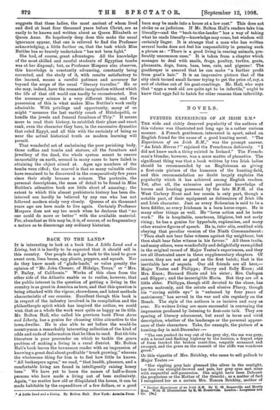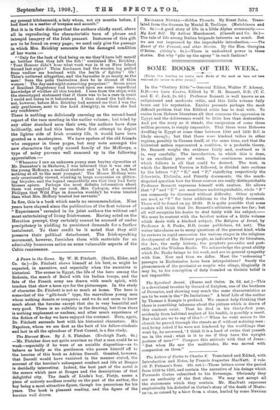NOVELS.
FURTHER EXPERIENCES OF AN IRISH R.M.* THE wide and richly deserved popularity of the authors of this volume was illustrated not long ago in a rather curious manner. A French gentleman, interested in sport, asked an English friend for the name of a good hunting novel. "The Experiences of an Irish R.M.," was the prompt answer: "An Irish Harem ?" rejoined the Frenchman dubiously. "I did not know such a thing existed in Ireland." The French- man's blunder, however, was a mere matter of phonetics. The significant thing was that a book written by two Irish ladies should be recommended by an Englishman as giving a first-rate picture of the humours of the hunting-field, and this recommendation no doubt largely explains the popularity which it has achieved among English readers.
Yet, after all, the extensive and peculiar knowledge of horses and hunting possessed by the late M.F.H. of the
West Carbery Hunt and her cousin is only part, though a notable part, of their equipment as delineators of Irish life and Irish character. Just as every Bohemian is said to be a
born fiddler, so every Irishman is a born horse-coper. He is many other things as well. He "loves action and he bates work." He is hospitable, courteous, litigious, but not early rising; be has a genius for hyperbole, euphemism, and many other evasive figures of speech. He is, inter alia, credited with obeying that peculiar version of the Ninth Commandment : "Thou shalt not bear false witness against thy neighbour, but thou shalt bear false witness in his favour." All these traits, and many others, were wonderfully and delightfully exemplified in the original record of Major Yeates'a experiences, and they are all illustrated anew in these supplementary chapters. Of course, they are not as good as the first batch; that is the inevitable law of sequels. Our old friends are all here,— Major Yeates and Philippa ; Flurry and Sally Knox ; ,old Mrs. Knox; Bernard Shute and his sister ; Mrs. Cadogan and Slipper ; and the incorrigible Maria. But they are all a little older. Philippa, though still devoted to the chase, has grown matronly, and the astute and elusive Flurry, though his "roving subtle eye" is "untamed by four years of matrimony," has served in the war and sits regularly on the Bench. The style of the authors is as incisive and racy as ever. No writers living are more successful in conveying the impression produced by listening to first-rate talk. They are sparing of literary adornment, but excel in terse and vivid description, whether of the landscape or the personal appear- ance of their characters. Take, for example, the picture of a hunting-day in mid-December :—
"The sun pushed its way out of the grey sky, the sea was grey, with a broad and flashing highway to the horizon, a frayed edge of foam tracked the broken coast-line, seagulls screamed and swooped, and the grass on the summit of the cliffs was wondrous green."
Or this vignette of Mrs. Brickley, who came to sell pollock to Major Yeates "Her rippling grey hair gleamed like silver in the sunlight, her face was straight-browed and pale, her grey eyes met mine with respectful self-possession. She might have been Deborah the prophetess or the Mother of the Gracchi ; as a matter of fact I recognised her as a certain Mrs. Honors Brickley, mother • of * Further Experiences of an Irish R.M. By E. (E. Somerville and Martin Boss. With 35 Illustrations by E. tE. Somerville. London : Longmans and Co. [60.]
my present kitchenmaid, a lady whom, not six months before, I bad fined in a matter of trespass and assault."
But it is in their dialogue that the authors chiefly excel, above all in reproducing the characteristic turn of phrase and
intrepid imagery of the Irish peasant. Instances of this gift are to be.found on every page; we need only give the passage
in which Mrs. Brickley accounts for the damaged condition of her wares :—
"'Only for the luck of God being on me they'd have left mesolf no betther than they left the fish ! ' continued Mrs. Brickley. Your Honour didn't hear what work was in it on Hare Island Strand last night ? Thim Keohanes had the wooden leg pulled from undher me husband with the len'th o' fightia' ! Oh! Thim's outlawed altogether, and the faymales is as manly as the men! Sure the polis theirselves does be in dliread of thim women ! The day-and-night-screeching porpoises!' Seven years of Resident Magistracy had bestowed upon me some superficial knowledge of whither all this tended. I rose from the steps, with the stereotyped statement that if there was to be a case in court I could not listen to it beforehand. I then closed the hall door, not, however, before Mrs. Brickley had assured me that I was the only gentleman, next to the Lord Almighty, in whom she had any confidence."
There is nothing so deliriously amusing as the second-hand report of the race meeting in the earlier volume ; but tried by any other standard save their own, the authors have done brilliantly, and had this been their first attempt to depict the lighter side of Irish country life, it would have been
greeted as a masterpiece. We have spoken of the old friends who reappear in these pages, but may note amongst the new characters the aptly named family of the McRorys, a type of noisy parvenu well summed up in the following appreciation :—
"Whenever I saw an unknown young man buying cigarettes at Mr. Dannaher's in Skebawn, I was informed that it was one of the young McRorys, a medical student and a bit of a lad, but nothing at all to the next youngest.' The Misses McRory were only occasionally viewed, whirling in large companies on glitter- ing bicycles, and the legend respectfully ran that they had forty blouses apiece. Perhaps the most definite information about them was supplied by our cook, Mrs. Catdogan, who assured Philippa that Wild Pigs in America wouldn't be worse treated than what Mrs. lltIcRory treated her servants."
In fine, this is a book which needs no recommendation. Nine years have elapsed since the publication of the first volume of " Experiences " revealed in its joint authors the wittiest and most entertaining of living Irishwomen. Having acted on the Horatian precept, they certainly cannot be accused of undue precipitancy in yielding to persistent demands for a further instalment. To their credit be it noted that they still preserve their political detachment. The Irish-speaking movement, however, furnishes them with materials for an admirably humorous satire on some vulnerable aspects of the Celtic renaissance.











































 Previous page
Previous page